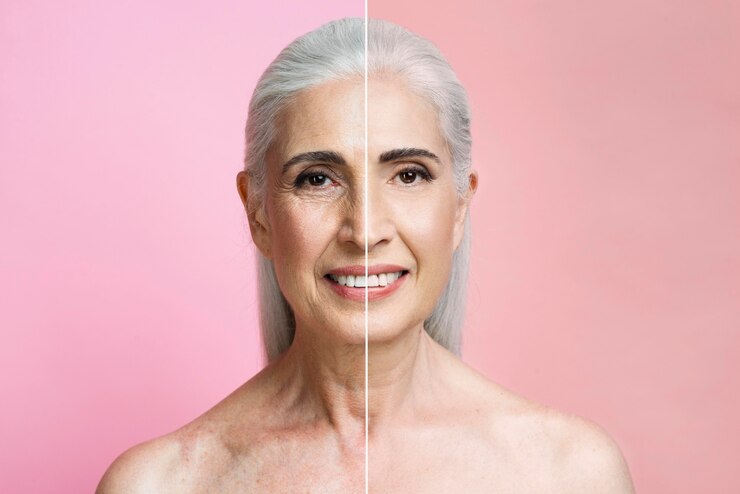Aging is an inevitable part of life, and as the years pass, our skin undergoes natural changes that reflect the passage of time. However, understanding the science behind skin aging empowers us to make informed choices and adopt effective strategies to prevent and even reverse the signs of aging. In this article, we delve into the scientific aspects of skin aging and explore practical approaches to maintain youthful and healthy skin.
The Science of Skin Aging:
- Intrinsic Aging:
- Collagen and Elastin Decline: Collagen and elastin, crucial proteins that provide structure and elasticity to the skin, naturally decrease with age.
- Cell Turnover Slows Down: The rate at which skin cells regenerate and turnover decreases, leading to a dull complexion and delayed healing.
- Extrinsic Aging (Photoaging):
- UV Radiation Damage: Exposure to ultraviolet (UV) radiation from the sun is a primary cause of premature aging. It accelerates collagen breakdown, causing wrinkles and sagging.
- Free Radicals: Environmental factors like pollution and smoking generate free radicals, unstable molecules that damage skin cells and accelerate aging.
Strategies to Prevent Skin Aging:
- Sun Protection:
- Broad-Spectrum Sunscreen: Daily application of a broad-spectrum sunscreen with at least SPF 30 protects against UV rays and prevents photoaging.
- Protective Clothing: Wearing hats, sunglasses, and clothing that shield the skin from the sun helps reduce UV exposure.
- Antioxidant-Rich Diet:
- Vitamins C and E: Foods rich in antioxidants, such as fruits and vegetables, can combat free radicals and promote skin health.
- Hydration: Drinking plenty of water supports skin hydration and overall health.
- Skincare Routine:
- Retinoids: Retinoids, derived from vitamin A, stimulate collagen production and promote cell turnover, reducing the appearance of wrinkles.
- Hydration: Moisturizing the skin maintains its suppleness and reduces the appearance of fine lines.
- Gentle Cleansing: Avoid harsh cleansers that strip the skin of natural oils, as this can contribute to dryness and irritation.
Strategies to Reverse Skin Aging:
- Topical Treatments:
- Retinoids: Prescription-strength retinoids, like tretinoin, can be effective in reducing fine lines and improving skin texture.
- Peptides: Peptide-based creams may stimulate collagen production and improve elasticity.
- Procedures:
- Chemical Peels: A chemical solution is applied to the skin, causing it to exfoliate and eventually peel off, revealing smoother skin.
- Microdermabrasion: Exfoliates the skin using a fine spray of microcrystals to remove the outer layer.
- Injectables:
- Dermal Fillers: Injectables like hyaluronic acid fillers can restore volume and reduce the appearance of wrinkles.
- Botulinum Toxin (Botox): Temporarily paralyzes facial muscles to reduce the formation of wrinkles.
Holistic Lifestyle Approaches:
- Healthy Diet and Exercise:
- Nutrient-Rich Foods: A diet high in antioxidants, omega-3 fatty acids, and vitamins supports overall skin health.
- Regular Exercise: Physical activity enhances circulation, delivering nutrients and oxygen to the skin.
- Adequate Sleep and Stress Management:
- Quality Sleep: Allows the skin to repair and regenerate.
- Stress Reduction: Chronic stress can accelerate aging; techniques such as meditation and yoga may help manage stress.
Understanding the science of aging empowers us to take proactive measures to preserve the health and vitality of our skin. A comprehensive approach, combining sun protection, a healthy lifestyle, and targeted skincare, can significantly impact the prevention and reversal of skin aging. By making informed choices and embracing science-backed strategies, we can navigate the aging process with grace and maintain a radiant and youthful complexion.








